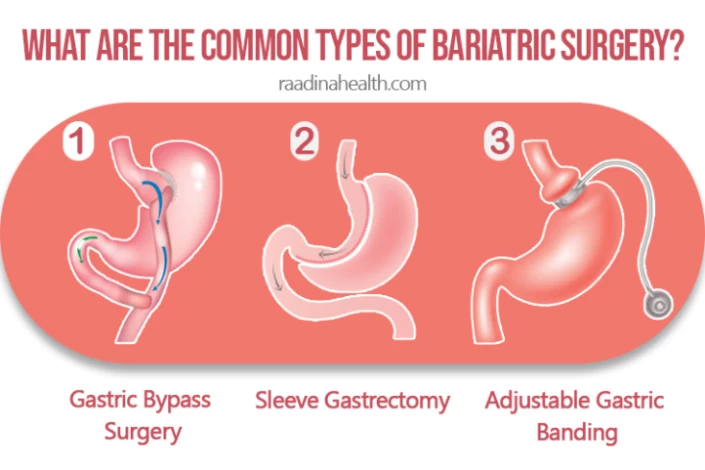What Is the Safest Form of Weight Loss Surgery?
Body Plastic Surgery
Weight loss surgery, also known as bariatric surgery, has become a popular option for obese people struggling to lose weight through diet and exercise alone. With various types of weight loss surgery available, many people wonder which procedure is the safest and most effective. In this article, we will explore the different types of weight loss surgeries, including gastric bypass surgery, gastric sleeve, and gastric banding, and discuss which option may be the safest for individuals seeking to achieve long-term weight loss and improved health.
Safety is a top priority for patients and surgeons when considering fat loss surgery. The safety of a weight loss surgery procedure is determined by factors such as the risk of complications, the success rate in achieving weight loss goals, and the impact on overall health. By examining the features of different types of weight loss surgery, we can better understand which procedure may offer the safest outcomes for patients looking to improve their quality of life through weight loss.
What Is Bariatric Surgery?
Bariatric surgery, also known as weight loss surgery, is a surgical procedure performed on severely overweight or obese individuals who have not been able to lose weight through diet and exercise alone. The primary goal of bariatric surgery is to help people achieve significant weight loss and improve or resolve obesity-related health conditions, such as type 2 diabetes, high blood pressure, sleep apnea, and heart disease.
Bariatric surgery is considered a major medical intervention that is usually recommended for individuals with a body mass index (BMI) of 40 or higher or a BMI of 35 or higher with obesity-related health conditions.

What Are the Common Types of Bariatric Surgery?
The most common types of bariatric surgery include:
Gastric Bypass Surgery
Gastric bypass surgery, also known as Roux-en-Y gastric bypass, is a common and effective weight loss surgery that involves creating a small pouch at the top of the stomach and connecting it directly to the small intestine. This procedure restricts food intake and decreases the absorption of calories and nutrients, leading to significant weight loss.
Gastric bypass surgery has been shown to improve or resolve obesity-related health issues such as type 2 diabetes, high blood pressure, sleep apnea, and high cholesterol.
Sleeve Gastrectomy
Sleeve gastrectomy, also known as vertical sleeve gastrectomy or gastric sleeve surgery, involves removing a large portion of the stomach to create a smaller, banana-shaped stomach pouch. This procedure restricts the amount of food consumed and reduces hunger by decreasing the production of appetite-regulating hormones. Sleeve gastrectomy is less invasive than gastric bypass surgery and is effective in achieving significant weight loss and improving obesity-related health issues.
Adjustable Gastric Banding;
Adjustable gastric banding, also known as laparoscopic adjustable gastric banding (LAGB) or simply gastric band surgery, is a type of weight loss surgery that involves placing an inflatable silicone band around the upper part of the stomach to create a small pouch. The band can be adjusted to control the size of the stomach opening, restricting food intake and promoting weight loss. While adjustable gastric banding is less invasive and reversible compared to other bariatric surgeries, it may result in slower weight loss and a higher risk of complications such as band slippage or erosion.

Which Is the Safest Weight Loss Surgery?
Sleeve gastrectomy is considered one of the safest weight loss surgeries for several reasons, including:
Simplicity of the Procedure
Sleeve gastrectomy involves removing a portion of the stomach and reshaping the remaining stomach into a sleeve-like structure. This straightforward approach may result in fewer surgical complications than complex procedures like gastric bypass or duodenal switch.
Reduced Risk of Nutritional Deficiencies
Unlike gastric bypass surgery, which can affect nutrient absorption due to changes in the digestive tract, gastric sleeve surgery preserves the natural digestive process. This may result in a lower risk of nutritional deficiencies in the long term.
Lower Risk of Dumping Syndrome
Gastric sleeve surgery does not alter the normal function of the pyloric valve, which helps regulate the emptying of food from the stomach into the small intestine. This reduces the risk of dumping syndrome, which can cause rapid heart rate, sweating, nausea, and diarrhea after eating certain foods.

Irreversibility
While gastric sleeve surgery is irreversible (once a portion of the stomach is removed, it cannot be reattached), it is considered a permanent but straightforward procedure that does not require the adjustments or revisions commonly required with gastric banding.
No Foreign Objects
Unlike gastric banding procedures, which involve placing a foreign object (the band) around the stomach, gastric sleeve surgery does not require implantable devices. This eliminates the potential risks associated with device-related complications.
Fewer Long-Term Complications
Studies have suggested that sleeve gastrectomy may have a lower rate of long-term complications, such as internal hernias or strictures, than other weight loss surgeries.
Is Weight Loss Surgery Safe?
Bariatric surgery is generally considered safe and effective for obese people who meet certain criteria and have tried other weight loss methods without success. However, like any surgical procedure, fat loss surgery carries some risks and potential complications. It is important for people considering bariatric surgery to understand both the benefits and risks associated with the procedure.

What Is the Least Invasive Weight Loss Surgery?
Laparoscopic adjustable gastric banding is typically considered to be the least invasive bariatric surgery. However, it may not result in as significant weight loss as other procedures.
Unlike more invasive surgeries like gastric bypass or sleeve gastrectomy, lap band surgery does not involve cutting or stapling the stomach or rerouting the digestive system. Additionally, since the digestive system remains intact, lap band surgery generally carries a lower risk of nutritional deficiencies and gastrointestinal issues commonly associated with more extensive bariatric surgeries.
What Are the Benefits of Bariatric Surgery?
Weight loss surgery can offer several benefits for individuals struggling with obesity. Some of them include:
- Significant and sustained weight loss;
- Improvement or resolution of obesity-related health conditions such as type 2 diabetes, high blood pressure, sleep apnea, and joint pain.
- Improved quality of life;
- Long-term weight maintenance;
- Reduced risk of premature death in individuals with severe obesity
- Increased fertility:
- Decreased risk of certain obesity-related cancers.
What Are the Complications of Weight Loss Surgery?
Some of the complications associated with bariatric surgery include:
- Infections at the surgical site or within the abdomen;
- Excessive bleeding during or after surgery;
- Blood clots in the legs or lungs;
- Dumping syndrome that can cause symptoms like nausea, vomiting, diarrhea, and weakness
- Nutritional deficiencies (deficiencies in vitamins and minerals such as iron, vitamin B12, and calcium)
- Gallstones;
- Hernias at the surgical incision or in the abdominal wall;
- Stricture or narrowing of the connection between the stomach and the small intestine that may lead to difficulty swallowing and vomiting;
- Gastrointestinal issues such as acid reflux, ulcers, gastroesophageal reflux disease (GERD), or bowel obstruction;
- Psychological issues like depression, anxiety, or body image concerns.
Which Weight Loss Surgery Has the Highest Success Rate?
The success of weight loss surgery can be measured in various ways, including weight loss, improvement in obesity-related health conditions, and long-term weight maintenance. However, gastric bypass surgery (Roux-en-Y gastric bypass) is often considered to have one of the highest success rates in terms of significant weight loss and improvement in obesity-related health conditions such as type 2 diabetes and high blood pressure.
Studies show an average excess weight loss of 60-80% and a high rate of remission for type 2 diabetes and other comorbidities after gastric bypass.

Which Weight Loss Surgery Has the Easiest Recovery?
While recovery experiences vary, some weight loss surgeries typically offer a smoother and faster recovery due to their minimally invasive nature. Weight procedures with easier recovery include:
- Laparoscopic Adjustable Gastric Banding (LAGB): This procedure involves placing an adjustable band around the upper stomach through small incisions without cutting or stapling the stomach or rerouting the intestines. As it's minimally invasive, patients often experience less pain, shorter hospital stays, and a quicker return to normal activities;
- Gastric Sleeve Surgery (Sleeve Gastrectomy): While more invasive than LAGB, sleeve gastrectomy typically involves a laparoscopic approach, minimizing surgical risks. This minimally invasive approach typically results in less pain, reduced risk of complications, and faster recovery. Patients undergoing sleeve gastrectomy usually have a shorter hospital stay compared to gastric bypass surgery, allowing them to return home sooner and resume normal activities more quickly
Which Weight-Loss Surgery is Best for Me?
The best weight loss surgery for an individual depends on several factors, including their body mass index (BMI), overall health, lifestyle, and preferences.
Roux-en-Y gastric bypass (RYGB) is often recommended for individuals with a higher BMI and those who struggle with controlling portion sizes, while sleeve gastrectomy (SG) is a less invasive option that may be better suited for individuals with a lower BMI and no significant gastrointestinal issues
Adjustable gastric banding (AGB) is a reversible and less invasive bariatric surgery, making it a potential choice for individuals who prefer a less permanent solution. Biliopancreatic diversion with duodenal switch (BPD-DS), on the other hand, is a more complex surgery typically reserved for people with severe obesity and related health conditions. It leads to significant weight loss and malabsorption of nutrients.

Weight Loss Surgery in Iran
With a focus on patient safety and satisfaction, weight loss surgery in Iran offers a safe and effective solution for individuals seeking long-term weight loss and improved overall health and well-being.
Iran has a long history of successful weight loss surgeries. Its internationally renowned surgeons and state-of-the-art medical facilities offer a wide range of bariatric procedures, such as gastric bypass, sleeve gastrectomy, and gastric banding, each tailored to the patient's specific needs and health conditions.
The commitment to patient safety is paramount in Iran, with surgeons adhering to the highest standards of surgical practices and utilizing advanced techniques to minimize risks and ensure optimal outcomes. Hospitals are well-equipped with cutting-edge technology and experienced medical staff, providing patients with a safe and comfortable environment throughout their surgical journey.
In addition, the cost of weight loss surgery in Iran is more affordable than in many other countries, making it a more accessible option for people who are struggling with obesity. This affordability allows more individuals to access the life-changing benefits of weight loss surgery.
Beyond the medical expertise and affordability, Iran is also a popular destination for weight loss surgery due to its cultural attractions, warm hospitality, and modern amenities. Patients can combine their medical treatment with a memorable travel experience, exploring this captivating country's rich history and diverse landscapes.
Final Word
Ultimately, the safest form of weight loss surgery depends on the individual needs, health conditions, and preferences. It is important to consult with a qualified bariatric surgeon to discuss the different options available and determine the best course of action.
All types of weight loss surgeries carry some degree of risk. However, the most common and safest procedure is sleeve gastrectomy (SG). This procedure has been performed successfully on millions of people worldwide and has a proven safety and effectiveness track record.
It is also important to note that weight loss surgery is not a magic bullet. It requires a lifelong commitment to healthy eating, exercise, and lifestyle changes. Following your doctor's instructions and making the necessary changes can maximize your results and achieve long-term weight loss success.
FAQs About Safest Methods of Weight Loss Surgery
1) Which weight loss surgery has the least side effects?
Laparoscopic adjustable gastric banding (LAGB) has fewer immediate risks and complications than other weight loss surgeries. Common side effects of LAGB include nausea, vomiting, and band slippage or erosion. However, they are often less severe than the potential complications associated with other surgeries.
2) What are the best non-surgical weight loss procedures?
Some noninvasive procedures, such as gastric balloon therapy or endoscopic procedures, can help individuals lose weight without surgery. These treatments are generally safe and effective for nonsurgical candidates.
3) What is the least painful fat loss surgery?
Laparoscopic weight loss surgeries such as laparoscopic gastric banding (Lap-Band) and laparoscopic sleeve gastrectomy tend to be less invasive and lead to a quicker recovery with less post-operative pain compared to open procedures like open gastric bypass surgery.
4) Which weight loss surgery has the highest failure rate?
While gastric banding can help many patients achieve significant weight loss, some may not achieve their desired weight loss goals or may experience weight regain over time. This procedure has also been associated with a higher rate of long-term complications and revisions compared to other weight loss surgeries, such as gastric bypass and sleeve gastrectomy.
 WhatsApp
WhatsApp
 Telegram
Telegram
 Facebook
Facebook
 Email
Email


No reviews
Your comment